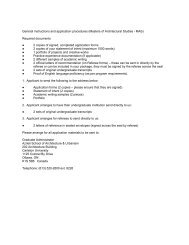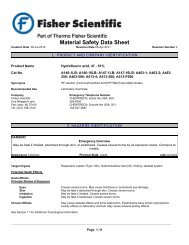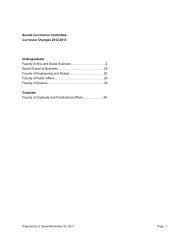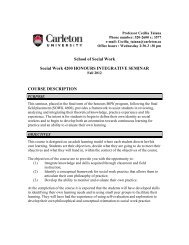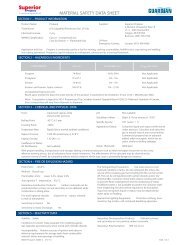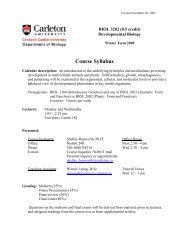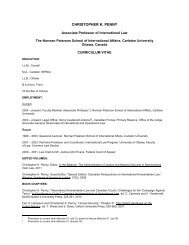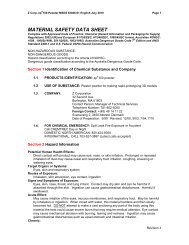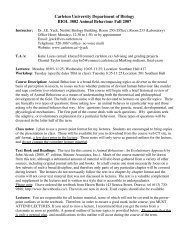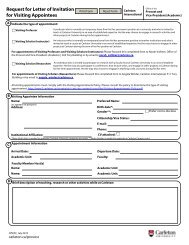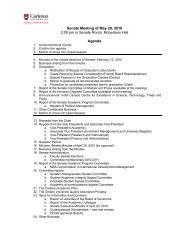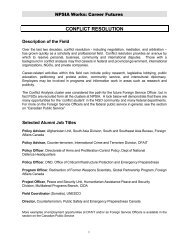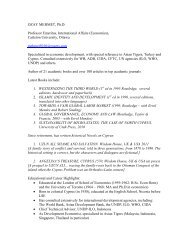PSCI 3109B - Carleton University
PSCI 3109B - Carleton University
PSCI 3109B - Carleton University
You also want an ePaper? Increase the reach of your titles
YUMPU automatically turns print PDFs into web optimized ePapers that Google loves.
<strong>Carleton</strong> <strong>University</strong> Winter 2007<br />
Department of Political Science<br />
<strong>PSCI</strong> <strong>3109B</strong><br />
The Politics of Law and Morality<br />
Wednesday 8:35 a.m. – 11:25 a.m.<br />
516 Southam Hall<br />
Instructor: Dr. C. Lam<br />
Office: B645 Loeb Building<br />
Office Hours: Mondays 10:00 – 12:00 or by appointment<br />
Phone: 520-2600 x 1657 (no voicemail)<br />
Email: celam@connect.carleton.ca<br />
-----------------------------------------------------------------------------------------------------------<br />
-<br />
COURSE DESCRIPTION<br />
This course explores the philosophical and theoretical roots of current, key questions of<br />
law and morality including the public/private distinction; particular vs. universal<br />
concerns; the differences between law and morality; and the appropriate role of the state<br />
in moral regulation.<br />
The first part of the course provides a critical survey of pertinent thinkers in the canon of<br />
Western political thought. We’ll begin in the ancient world of Aristotle and proceed to<br />
the theory of J.S. Mill to better understand basic analytic frameworks for current<br />
conceptions of law and morality, and the relationship between the two. Is law<br />
“manmade” and morality inherent? How do they differ, how are they similar and why?<br />
What themes and problems emerge through such an exploration?<br />
The second part of the course examines these philosophical issues by rooting them in<br />
current bioethical dilemmas and debates (especially those surrounding new reproductive<br />
technologies and medicine in the North American context), which highlight the complex<br />
relationship between politics, law and morality. These topical issues will be examined<br />
especially as they are treated in a human rights framework, and public policy.<br />
Through your participation in this course, (including attending lectures, analyzing and<br />
engaging with required readings, contributing to discussion, and completing the written<br />
assignments) you’ll be able to: engage key moral theories and debates; understand and<br />
assess the theoretical foundations of contemporary ideas of law and morality and their<br />
relationship; appreciate the complexity of the issues involved in some of the key ethical<br />
debates prevalent in modern, technologically-driven societies; and refine your reading,<br />
writing, critical and analytical skills.<br />
In class discussion will comprise a significant portion of the course. Come prepared to<br />
discuss central concepts from the week’s readings and contribute to the conversation.<br />
1
Guest lectures, films and other materials will be used where appropriate at the<br />
instructor’s discretion.<br />
REQUIRED TEXTS<br />
The following texts will be available through Octopus Books located at 116 Third<br />
Avenue (West of Bank Street).<br />
nd<br />
Donnelly, Jack. International Human Rights in Theory and Practice (2 edition). USA:<br />
Cornell <strong>University</strong> Press, 2003.<br />
Somerville, Margaret. The Ethical Imagination: Journeys of the Human Spirit. Canada:<br />
House of Anansi Press, 2006.<br />
NOTE: Additional readings will be available on reserve at the MacOdrum library, via<br />
website and/or distributed in class.<br />
COURSE REQUIREMENTS<br />
Students must complete each of the following components of the course to achieve a passing<br />
grade.<br />
10% Attendance and contribution to class discussion<br />
10% Short paper due: January 31 st<br />
Details will be distributed in class<br />
30% Mid-term exam in class: February 14 th<br />
10% Short paper due: Sometime in the second half, to be determined<br />
Details will be distributed in class.<br />
40% Final Exam during the April exam period (April 9 – 28)<br />
GRADING FORMULA<br />
A+ 90-100 B+ 77-79 C+ 67-69 D+ 57-59<br />
A 85-89 B 73-76 C 63-66 D 53-56<br />
A- 80-84 B- 70-72 C- 60-62 D- 50-52<br />
10% ATTENDANCE AND CLASS CONTRIBUTION<br />
Each class will include a tutorial component employing various techniques as appropriate<br />
including group discussion, direct question and answer in the dialectical tradition etc. Signpost<br />
questions may be assigned to facilitate your reading and discussion. You must attend and<br />
participate in class to progress, and to achieve a satisfactory grade. Your attendance will be<br />
recorded via a sign-in sheet, and your participation will be noted and assigned a grade. Lateness<br />
does not excuse you from recording your name, and where there is dispute, the sign in sheet has<br />
the final authority. If you’ve consistently been in class (missing no more than two classes<br />
2
without documentation), and contributed verbally to discussion at least once during the<br />
term you’ll earn this portion of the grade.<br />
10% SHORT PAPER: DUE JANUARY 31<br />
5 typed, double-spaced pages.<br />
Critically assess one of the thinkers of topic in the first six weeks, on the basis of themes<br />
and questions introduced in the introductory lecture.<br />
Consider the following questions to get started:<br />
<br />
<br />
<br />
what do they contribute to the main terms of our analysis?<br />
what course themes emerge in the reading? How? Give examples.<br />
If a contemporary example would clarify your assessment include one.<br />
*Papers are to be submitted to the professor directly in class, or during office hours.<br />
They will be returned before the midterm exam either in class, tutorial, or through<br />
TA’s office hours.<br />
30% MIDTERM EXAM: February 14<br />
Length and details to be confirmed.<br />
The exam will be based on all materials and lectures to date.<br />
10% SHORT PAPER: DUE DATE To be determined<br />
5 typed, double-spaced pages.<br />
Define and evaluate the cultural relativism/moral universalism debate, using a<br />
relevant example.<br />
40% FINAL EXAM<br />
3 hour essay-style exam during the April exam period (April 9 – 28).<br />
The exam will be based on all materials and lectures covered.<br />
WRITTEN ASSIGNMENTS<br />
Please use MLA or APA notation formats, and take care to avoid common grammatical<br />
and syntactical mistakes. Also, make use of the spell-check function of your word<br />
processor. Good writing is a basic requirement for the communication of your ideas.<br />
Please take advantage of the university’s writing tutorial service if you run into trouble.<br />
SUBMISSION POLICY<br />
All assignments are to be submitted directly to the professor in class, or during office hours. Late<br />
papers may be submitted via the Political Science Drop Box. Please note the drop box policy: it is<br />
3
emptied every weekday at 4 p.m. and all items collected at that time are date-stamped with that<br />
day’s date. Any paper received after 4 o’clock will be considered a next day submission with<br />
applicable penalty.<br />
LATENESS POLICY<br />
You may have an extension on your paper automatically; however, marks will be<br />
deducted for late submissions at the rate of one third of a letter grade per day, for e.g. B+<br />
to B, with weekends counting as two days. Late papers may be dropped in the political<br />
science office, but note that unless they are stamped by the department, the date I receive<br />
the paper is the date recorded. I won’t be in my office daily, so you take a risk if you<br />
don’t get the paper to me directly.<br />
th.<br />
The latest date I will accept any late term work is April the 5 No exceptions will be<br />
made. If you are under extenuating circumstances you will need to have made prior<br />
arrangements with me, and present formal documentation for medical problems.<br />
Course Schedule<br />
*Readings may be changed or supplemented throughout the course at the discretion of<br />
the professor.<br />
January 3: Introduction<br />
Reading:<br />
Course syllabus<br />
January 10: Framework(s) for the Course<br />
PART ONE: THEORETICAL FOUNDATIONS<br />
Readings:<br />
Somerville, Margaret. “Going on the Ethical Wallaby: Searching for a Shared Ethics.” Chapter 1,<br />
The Ethical Imagination, pp. 1- 52.<br />
January 17: Aristotle (and the Ancients)<br />
Readings<br />
Selections from Nichomachean Ethics and/or The Politics<br />
Available via website or reserves to be determined (TBD)<br />
January 24: Hobbes<br />
Readings<br />
Introduction to, and selections from, Leviathan<br />
Available via website or reserves TBD<br />
January 31: Locke on Natural Law<br />
4
Readings<br />
Selection from The Second Treatise of Government<br />
Available via website or reserves TBD<br />
***SHORT PAPER DUE IN CLASS<br />
February 7: John Stuart Mill<br />
Readings<br />
Mill, John Stuart. “Of the Limits to the Authority of Society over the Individual.” On Liberty.<br />
Online: http://etext.library.adelaide.edu.au/m/mill/john_stuart/m645o/<br />
*Please note that hard copy versions of the previous readings that you may already own are<br />
not acceptable versions. For consistency of referencing and grading please use the<br />
electronic version.<br />
February 14: MIDTERM EXAM in class covering all material and lectures to date.<br />
February 19 – 23: WINTER TERM BREAK *NO CLASSES<br />
Part Two: CONTEMPORARY ISSUES<br />
February 28: Human Rights – Part One:<br />
“Toward a Theory of Universal Human Rights.”<br />
What are Human Rights?<br />
Readings<br />
Donnelly, Jack. Chapter 1, “The Concept of Human Rights.” Universal Human Rights in Theory<br />
and Practice. United States: Cornell <strong>University</strong> Press, 1989. pp. 7 – 46.<br />
March 7: Human Rights – Part Two:<br />
Moral Universalism v. Cultural Relativism<br />
Readings<br />
Donnelly, Jack. Part III: “Human Rights and Cultural Relativism.” Pp. 107-160.<br />
March 14: Human Rights – Part Three:<br />
Critique of Rights-Based Frameworks<br />
Readings<br />
Donnelly, Jack. Part II: “Human Rights, Liberalism, and the West.” Universal Human Rights in<br />
Theory and Practice. Pp. 47 – 106.<br />
5
Voet, Rian. “Feminism.” Feminism and Citizenship. UK: Sage, 1998.<br />
Rao, Arati. “The Politics of Gender and Culture in International Human Rights Discourse” in<br />
women’s rights human rights: international feminist perspectives. Eds. Julie Peters and Andrea<br />
Wolper. New York: Routledge, 1995.<br />
Supplementary Readings:<br />
Bunch, Charlotte. “Transforming Human Rights From a Feminist Perspective.” Women’s rights<br />
human rights: international feminist perspectives. Eds. Julie Peters and andrea wolper. New<br />
York: Routledge, 1995.<br />
Marshall, Jill. “Universalism and the Exclusion of the Feminine.” Humanity, Freedom, and<br />
Feminism. UK: Ashgate Publishing Limited, 2005.<br />
March 21: New Reproductive Technologies<br />
Readings<br />
Bill C-13, An Act respecting assisted human reproduction and related research (available at:<br />
http://www.parl.gc.ca/37/2/parlbus/chambus/house/bills/government/C-13/C-13_3/90187bE.html).<br />
Canada, Royal Commission on New Reproductive Technologies (Ottawa: 1993):<br />
Overview of Legal and Ethical Issues in NRTs: Pregnancy and Parenthood, Research Studies,<br />
Vol. 4, Proceed with Care: Final Report<br />
DOC CA1 Z1 89. ROI ENG (you’ll need to photocopy it).<br />
*Possible Film: Children of Donor Insemination<br />
March 28: Biotechnology/Genetic Engineering<br />
Readings<br />
TBD<br />
April 4: This day will be treated as one of the following: a regular class, a review class, or<br />
opportunity for extended office hours, to be determined by the professor in light of the progress of<br />
the course.<br />
April 9 – 28: The Final Exam will be scheduled by the registrar for a time during this period.<br />
Academic Accommodations<br />
For Students with Disabilities: Students with disabilities requiring academic accommodations in<br />
this course are encouraged to contact the Paul Menton Centre (PMC) for Students with<br />
Disabilities (500 <strong>University</strong> Centre) to complete the necessary forms. After registering with the<br />
PMC, make an appointment to meet with the instructor in order to discuss your needs at least two<br />
weeks before the first in-class test or CUTV midterm exam. This will allow for sufficient time to<br />
process your request. Please note the following deadlines for submitting completed forms to the<br />
6
th<br />
PMC for formally scheduled exam accommodations: November 6 , 2006 for fall and fall/winter<br />
th<br />
term courses, and March 9 , 2007 for winter term courses.<br />
For Religious Observance: Students requesting accommodation for religious observances<br />
should apply in writing to their instructor for alternate dates and/or means of satisfying academic<br />
requirements. Such requests should be made during the first two weeks of class, or as soon as<br />
possible after the need for accommodation is known to exist, but no later than two weeks before<br />
the compulsory academic event. Accommodation is to be worked out directly and on an individual<br />
basis between the student and the instructor(s) involved. Instructors will make accommodations in<br />
a way that avoids academic disadvantage to the student. Instructors and students may contact an<br />
Equity Services Advisor for assistance (www.carleton.ca/equity).<br />
For Pregnancy: Pregnant students requiring academic accommodations are encouraged to<br />
contact an Equity Advisor in Equity Services to complete a letter of accommodation. Then, make<br />
an appointment to discuss your needs with the instructor at least two weeks prior to the first<br />
academic event in which it is anticipated the accommodation will be required.<br />
Plagiarism: The Undergraduate Calendar defines plagiarism as: "to use and pass off as one's<br />
own idea or product, work of another without expressly giving credit to another." The Graduate<br />
Calendar states that plagiarism has occurred when a student either: (a) directly copies another's<br />
work without acknowledgment; or (b) closely paraphrases the equivalent of a short paragraph or<br />
more without acknowledgment; or (c) borrows, without acknowledgment, any ideas in a clear and<br />
recognizable form in such a way as to present them as the student's own thought, where such<br />
ideas, if they were the student's own would contribute to the merit of his or her own work.<br />
Instructors who suspect plagiarism are required to submit the paper and supporting<br />
documentation to the Departmental Chair who will refer the case to the Dean. It is not permitted<br />
to hand in the same assignment to two or more courses. The Department's Style Guide is<br />
available at: www.carleton.ca/polisci/undergrad/styleguide.pdf<br />
Oral Examination: At the discretion of the instructor, students may be required to pass a brief<br />
oral examination on research papers and essays.<br />
Submission and Return of Term Work: Papers must be handed directly to the instructor and will<br />
not be date-stamped in the departmental office. Late assignments may be submitted to the drop<br />
box in the corridor outside B640 Loeb. Assignments will be retrieved every business day at 4<br />
p.m., stamped with that day's date, and then distributed to the instructor. For essays not returned<br />
in class please attach a stamped, self-addressed envelope if you wish to have your assignment<br />
returned by mail. Please note that assignments sent via fax or email will not be accepted. Final<br />
exams are intended solely for the purpose of evaluation and will not be returned.<br />
Approval of final grades: Standing in a course is determined by the course instructor subject to<br />
the approval of the Faculty Dean. This means that grades submitted by an instructor may be<br />
subject to revision. No grades are final until they have been approved by the Dean.<br />
Course Requirements: Students must fulfill all course requirements in order to achieve a passing<br />
grade. Failure to hand in any assignment will result in a grade of F. Failure to write the final exam<br />
will result in a grade of ABS. FND (Failure B No Deferred) is assigned when a student's<br />
performance is so poor during the term that they cannot pass the course even with 100% on the<br />
final examination. In such cases, instructors may use this notation on the Final Grade Report to<br />
indicate that a student has already failed the course due to inadequate term work and should not<br />
be permitted access to a deferral of the examination. Deferred final exams are available ONLY if<br />
the student is in good standing in the course.<br />
Connect Email Accounts: The Department of Political Science strongly encourages students to<br />
sign up for a campus email account. Important course and <strong>University</strong> information will be<br />
7
distributed via the Connect email system. See http://connect.carleton.ca for instructions on how to<br />
set up your account.<br />
8



